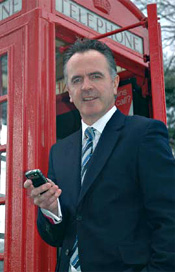
 |
| Chess Telecom’s chief executive David Pollock |
Chess Telecom’s chief executive David Pollock is in a good mood. It’s a sunny day in his company’s relaxed headquarters in Alderley Edge, Manchester and he’s just finished celebrating his award of Entrepreneur of the Year at Comms Business’s annual awards, Mobile Business’s sister title. Unfortunately, he wasn’t at the awards but the gong will no doubt cause his mantelpiece to groan even more, as it joins no fewer than nine other awards in just the past two years.
Chess Telecom has become one of the biggest players in the fixed line telecoms market. Launched in 1993 – and named after Pollock’s two children, Charlie and Jess - it has risen to a 100- strong company which looks set to turnover £25 million this year. It would be easy to think that a company the size of Chess could forget about the pastoral care that comes with a small business, but according to 48 year-old Pollock, keeping his staff happy is just as important as keeping his customers happy.
“What’s unique about Chess, is that we have a very strong culture and it’s a nice place to work,” says Pollock. “We’re not the idle rich, we do have to go to work, so why not go to work in a nice place and create a good business to be
proud of. If you’re choosing who you want to work for and with, you want to work with a company that has a good reputation. I think the reason we’re so successful is because of the way we look after our customers, our partners and our staff.”
The corporate responsibility doesn’t end there. Earlier this year, Chess was one of just 19 companies praised by Prince Charles at his annual May Day Climate Change event, because of its commitment to reducing its carbon footprint. In the last few ears, Chess has increased recycling by 100%, reduced costs by becoming energy efficient and saved over 3 tonnes of paper every year by switching its 10,000 UK business customers to web billing.
Don’t think Pollock’s ambitions stop at the fixed line market. Chess has recently just launched a unique service in the UK, allowing its customers who have fixed line and mobile to enjoy free calls from their fixed line to their office mobiles.
“We’re offering a fairly unique tariff in the marketplace where we’re linking fixed line calls, fixed line rental and mobile and putting them all in the one bundle,” he says. “You’ve got to manage it carefully and have the right billing platform, maybe some people [dealers] don’t see it as an opportunity. We see it as important for maximising the customer retention, the more products the customer has, the stickier they become. In fact we had T-Mobile on the phone asking us how we were going to do it, which I thought was quite amusing!”
Even though the dealer doesn’t pay, the customer doesn’t pay and the network doesn’t pay, Chess is still making money.
“We make sales we wouldn’t normally have sold,” Pollock says. “We’re selling mobiles to customers that have got landline, and landline to mobile customers. We’re giving away some of the profits that we would have made on selling it as a standalone product by selling it as a converged model. I think the mobile networks realise they’ve got to converge their brand proposition and they’ve got to work out tactically how they’re going to do that. They need experience in that arena to do that so they need to decide who they’re going to buy or merge with.”
Even though Chess launched into the mobile market in 2004, this product has been a while in development.
“We had done a lot of enhancements to our billing platform, as it’s not exactly a breeze to organise the logistics to how you handle the free calls and how it works within the billing platform,” he says. “We invested in upgrading our billing platform in the last few months, as we’re always interested in innovative products.”
The response to the new free mobile calls service has been so phenomenal that Chess is now looking for mobile dealers to join its partner scheme.
“There’s a huge opportunity in this market. If you selling fixed line and you’re not selling mobile, or you’re selling mobile and you’re not selling fixed, then you’re missing a trick,” he says. “It’s good ongoing recurring revenue that dealers are missing out on. BT still dominates the market, they still charge too high prices and they still deliver poor service. I think that’s why companies like Chess are so successful, we provide low cost and we have good customer service. If you look at Ofcom’s statistics, customers want one port of call for their communication needs. They want one hand to shake or one throat to throttle. Some people will hop for every five minutes to save pennies, but others just want a consistently good provider. We do have people who hop in and hop out, but equally we have a good solid base who stick with us because we give a good service. We’re seriously looking for new mobile partners to sell mobiles but also how they can sell fixed line into their customers. They’re really missing a trick where they can get extra revenue for their business. We can show them how to do it, and actually do it on their behalf. We believe that partners should be able to make more money as they’re able to cross-sell more products.”
And if mobile dealers aren’t sure they want to diversify?
“I think I a lot of businesses are happy to do what they’ve always done, but I believe if you always do what you’ve always done, then you’ll always get what you’ve always got,” he says, pragmatically.
